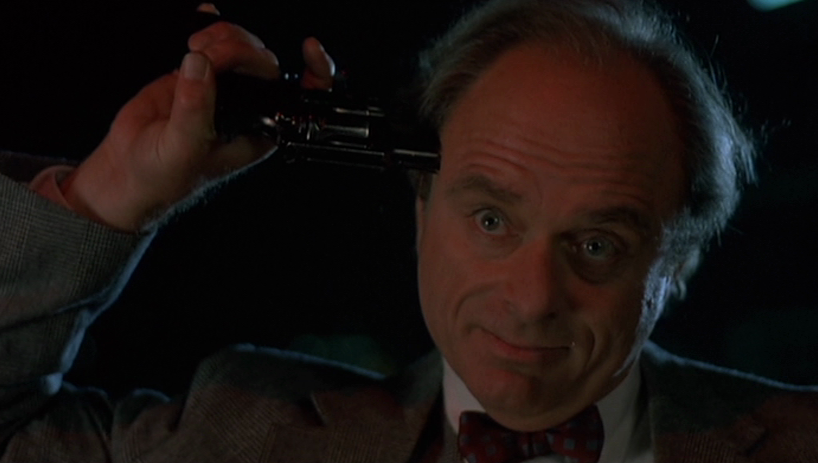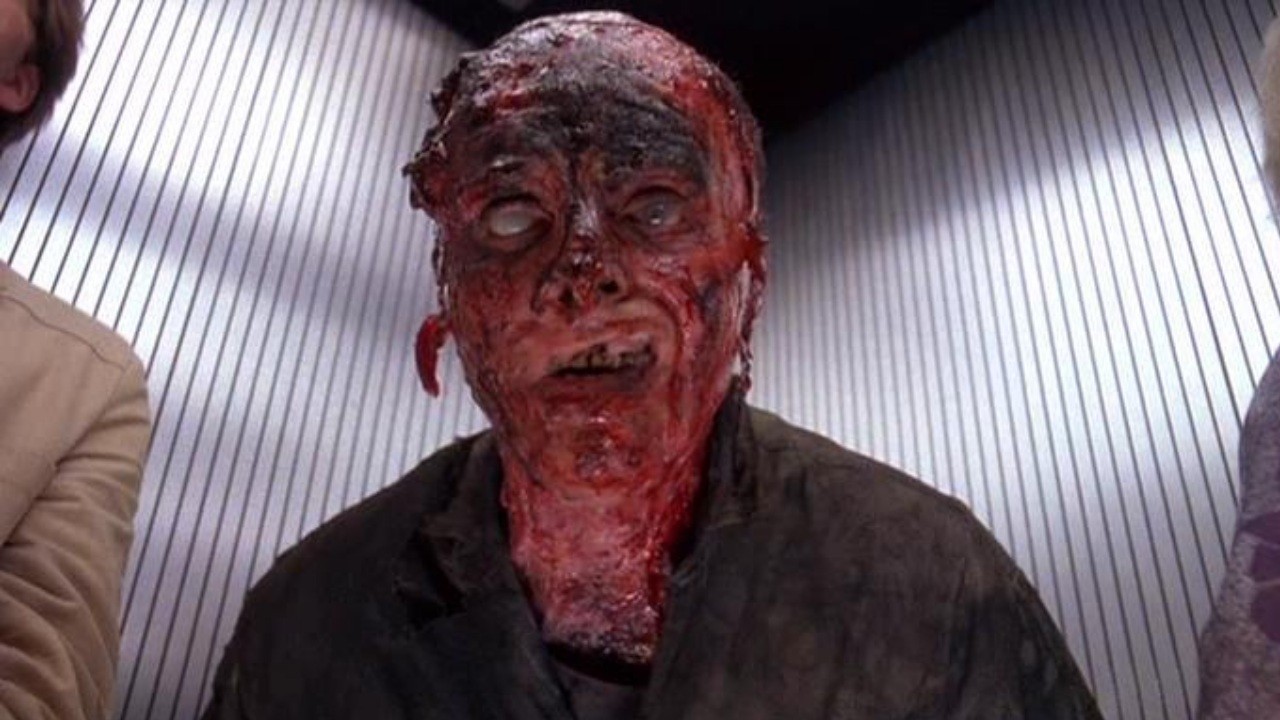
HORRORTHON 2011:
PART TWO
john b. cribbs
It's that time of year again. The leaves turn, the footballs fly, and the VCR comes out of storage so we at the Pink Smoke can do what no one else on the internet does: watch horror movies and write about them.
Ok, It may not be groundbreaking, but for us reviewing movies of the macabre while snacking on candy corn is fun and educational. We didn't go for any specific theme this year for the overall horrorthon... but since the two movies I wrote about last time centered on male protagonists I picked three movies about women being pestered by supernatural forces.
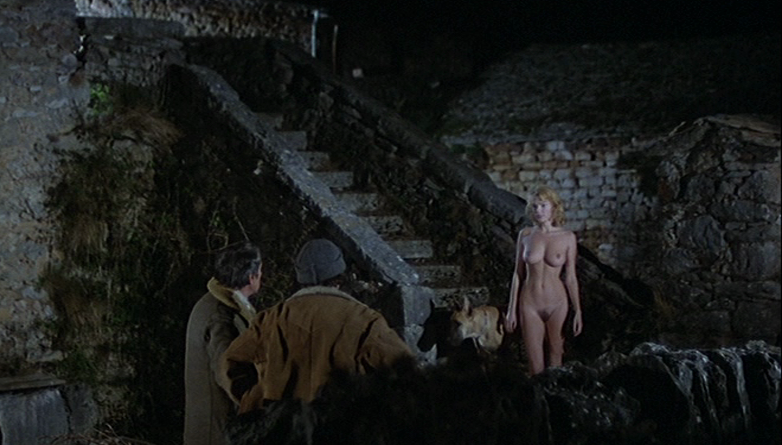
tasting the
GRAPES OF DEATH
jean rollin, 1978
Some horror movies are sour on arrival, others age well. Fortunately this infection horror film by the highly prolific Jean Rollin, undisputed master of the lesbian vampire movie, is of good vintage (don't worry I've officially run out of wine terminology.) A cautionary tale against mixing your own experimental pesticides, Grapes of Death is like other European exports derived from the zombie film formula (Let Sleeping Corpses Lie, Fulci's Zombi 2) in that it utilizes lots of space. No boarded-up house or fortified shopping mall for these survivors: they're on their own through leagues of foreign territory, making their way across vast stretches of French countryside, rocky fields and villages populated by murderous madmen who had their minds grape-raped by tainted wine from the regional vineyard. These victims of the vino, wandering mindlessly with bloodlust in their eyes and pustulating sores on their faces, most closely resemble Romero's Crazies (making them...Grapezies?) but come off as even creepier, mainly due to a common simmering mildness that suddenly gives way to outright rampaging. These are truly tragic monsters, clinging to their decaying humanity, appearing just as repulsed by the grotesque disintegration of their bodies as those fleeing from the sight of their exposed brains. They're not exactly determined - most give up mid-chase, or beg to be killed after seeing what they've done. They have self esteem issues and seem more depressed than dangerous, although they're more than capable of taking the odd rusty, sharp farming tool to the abdomen of anyone who gets too close and can't - or won't - pull themselves away.
The biggest scene comes in the middle of the film, when the heroine and a blind girl she's found wandering the hills return to the blind girl's town. A precursor to the insane village of Gymkata, with beautiful images of burning stone structures, the hilly burg is overrun with infected locals looking to maim tourists and uncontaminated townsfolk alike. The poor blind girl ends up crucified on the back of a door prior to her pockmarked boyfriend making out with her severed head (with tongue - hey, they're still French.) The heroine is betrayed by a beautiful blonde who, unlike the other ravenous residents, somehow maintains her perfect skin and mental facilities so that she's become the leader of this legion of leper-like outcasts. Luckily, two men show up (uneffected by the wine because they prefer beer), save the girl, burn the blonde and make their way to where it all started to try and put an end to the inebriant onslaught.
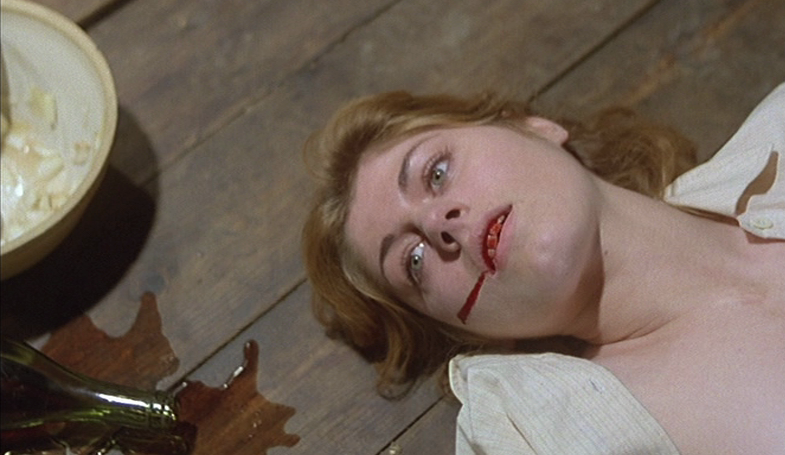
Is this whole scenario symbolic of being drunk? The wine is the cause of people acting strangely, ugly, violently...the kind of things that can happen when one's tied off a few too many. And again, the self esteem issues and general inability to get simple tasks done? Telling signs of overindulgence. I don't really buy that, but I did note some sort of political subtext that you people are free to take or leave. Maybe I'm reading too much into the movie, but what I sensed was the feeling of lingering French shame over the German occupation. It's brought up that one of the two rescuers fought in the resistance against the Vichy Regime, an experience that awakened his appreciation of his place in society, inclination towards retaliatory violence (his chum chides him for his mindless eradicating of the enemy) and condemnation of sentimentality ("Flowery speeches don't impress me - I'm a peasant!")
But even more supportive of this theme is the scene in the village with the heroine leading the blind girl past the dead bodies while claiming there's nothing to see, keeping her in the dark about what's happened. Ostensibly she wants to protect her from the truth about what's become of her friends and neighbors, but she's also maintaining her own sanity by deluding herself into ignoring the horror around her, trying her best to continue despite the situation just like the citizens of occupied Paris. Then we meet the blonde, who brags about taking over the mayor's home, the best house in the village, after he was killed: she's a collaborator taking advantage of the situation; allowing herself all the advantages of her ravaged, besieged home.
And of course it makes sense that she's revealed to be an actual collaborator, seemingly uninfected but selling out the heroine to the creatures outside the first chance she gets. Beautiful ex-porn star Brigitte Lahaie has the perfect Aryan features and physique for the role (she scammed Nazis as a prostitute working with the resistance in Brothel SS from the same year) which almost fools the two liberators who come upon her when entering the town and feast upon her glorious nude body, free of telling marks of infection. Flanked by two German Mastiffs like the B-movie version of a concentration camp commandant, she sets her braindead underlings to seek out and destroy the one person in town who's different from them. And her fate, as befell collaborators in France at the end of the war, is to be disfigured and humiliated in front of a crowd (well, three people but that's as close to a crowd as you're getting in a town of maybe three dozen zombies.) The same sort of punishment was handed out by a father to his terrified daughter earlier in the film: he rips off her clothes to reveal the hidden sign of her disease and skewers her with a pitchfork, a melodramatic enactment of how French fathers ostracized and exiled girls who had affairs with German soldiers during the morally gray period of occupation.
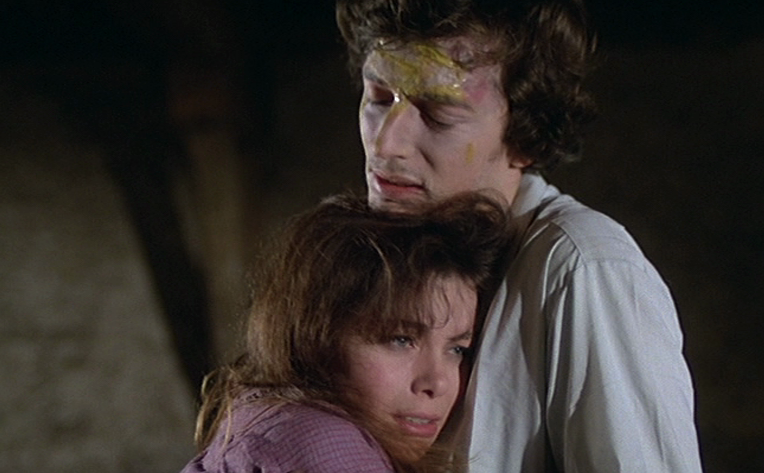
Another thing I really like about the film is its warped logic. When the first lunatic attacks the heroine on a surreally empty train (they probably just didn't have money to hire extras, but it's eerily effective) she's not going to run to the conductor - she's going to book it halfway across the country into fog-enshrouded remoteness. When she comes upon the father/daughter couple in their farmhouse, there's a long stand-off of staring before she makes her way upstairs and finding the frozen corpse of the mother laying stiffly in the bed. This kind of thing works best applied to Rollin's fascination with the connection between love and death: the blind girl and her, uh, blind devotion to the man she seeks out - her eventual murderer - is one thing, but even more jarring is the heroine's acceptance of her own boyfriend, who's not only on a steady slope towards sloppy mess of a mixed-up non-zombie but turns out to be the one responsible for the whole salmaguni. Not only does she embrace him despite her firsthand experience of the horrors he's caused, her reaction to him being blown away is indicative of how lost she is, how unsalvageable her level of perturbance.
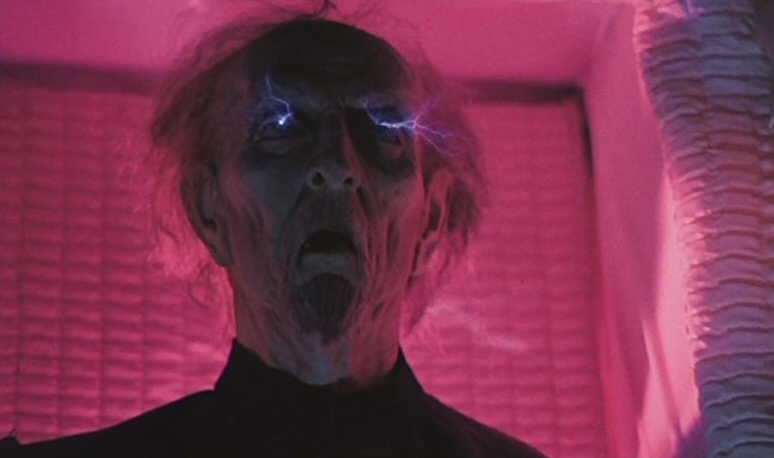
making it through
ONE DARK NIGHT
tom mcloughin, 1982
Horror films lean towards a subtle yet unyielding "anti-prank" stance. Don't dump pig's blood on the awkward wallflower or she'll impale you with the gym rafters. Don't haze the class nerd or he's gonna come back 10 years later with your name on a death list. Don't trick a girl into taking demerol and lock her in a mausoleum, then sneak back with Halloween masks and try to scare her...chances are, the building may have recently interred a notorious psychic vampire who still has enough power within him to telekinetically rip out coffins from behind the marble foundations and re-animate the rotten corpses inside in order to send them after you. The funny thing is, these movies don't have a very balanced sense of justice. Sure pranks are mean and "not cool," but just because some stupid kids pull one doesn't mean they deserve to be horribly killed, right? It's presumptuous to try and sell people on the whole "Oh, you thought it would be funny to put on a scary mask and spook some easily-frightened kid? Well then maybe you'll think it's funny when it turns out that monsters are real and they're going to suck your life right out of you. Maybe next time you'll think before being such a bully. Sincerely, the movie."
The innocent target of One Dark Night's prank is Meg "sister of Jennifer" Tilly, who I'm always getting mixed up with Meg "not the sister of Jodie" Foster. She's been in some good movies (Psycho II, Body Snatchers) so it's hard to remember that she's not much of an actress (although she's cute enough and in one waking up scene has adorably coiffed bedhead.) Still, I don't think it's her fault that the character she's playing in this one is not very likable. She wants in with a trio of Heathers-like popular girls who call themselves The Sisters (two chicks plus E.G. Daily) and wear matching letterman jackets to denote membership. All three are complete assholes to her, but she still tags along hoping to be accepted even when it becomes clear that the head Sister just wants revenge on her for dating her basketball stud ex-boyfriend. She agrees to this initiation that involves her packing a sleeping bag and shacking up in the mausoleum overnight, and seems to have no idea whatsoever that maybe these girls are going to circle back and try to frighten her.
As if her level of ignorance wasn't already offensively high, she does nothing but cry and cower when two of the three girls show up in lame disguises (E.G. takes stand against the prank and is ousted from the car, so she doesn't die but is certainly in danger of being kidnapped and raped on the road) and never changes her attitude once shit gets real. To be fair, she has taken demerol and is clearly whacked out of her mind, but why take your main character out of the movie entirely? The stud doesn't show up until the very end and doesn't fit the bill as the heroic savior. There's just no character to hang your coat on, and therefore very little reason to stay with the movie.
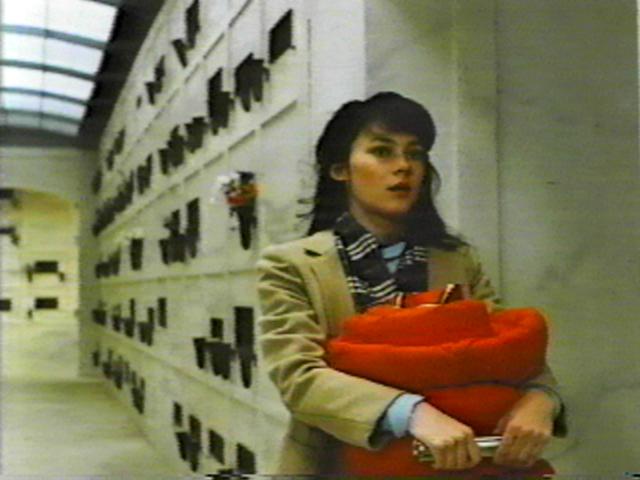
Of some interest is the poltergeist himself, who gets a lengthy exposition care of a former colleague after his body is found at a strange crime scene where dishes are embedded in the walls, electric volts are coursing through his corpse and stacked in the closet is a pile of dead college girls. As it happens, the guy was some kind of a sorcerer capable of channeling bio-energy, the electromagnetic force of all living things (you know, the kind that can be photographed with Kirlian photography?) Sadly he chose not to use his gift for good and became a psychic vampire, sucking bio-energy from others to gain telekinesis, apparently the more scared the subject the better. He even had a serial killer past where instead of torturing rats with a hacksaw and pulling the wings off of flies he'd kill an animal and bring it back to life using his power.
All of this is revealed through a recording, which coincides with his slow return from the dead at the mausoleum, so it's shot very similarly to Evil Dead 1 & 2. This confused me because it seemed as if the recording was the thing bringing him back to life, but how could a cassette of somebody talking about him miles away revive him? (It doesn't, it's Meg Tilly's fear that brings him back I guess, but seriously if you've seen the Evil Dead movies it's just like the recording of the Necronomicon that awakens the thing in the woods - the actor even reads it in a very deep, professorial monotone.) "Your father allowed himself to die," the colleague explains to the woman listening to the tape (wife of Adam West, who has nothing to do in the movie except try to kick the colleague out of the house.) It's never fully explained why he would let himself die, unless he predicted that some dumb high school kids would break into his resting place and scare their friend enough that he could feed on her fear and make a triumphant return from the grave. I guess I wouldn't put it past him - he's a psychic vampire.
Psychic vampires? Sucking the bio-energy out of living beings? Electric bolts? It's all more than a little similar to Lifeforce. Although this movie came first, it doesn't have that movie's ambition or flat-out craziness or naked large-breasted space vampires, but there are a few nice touches. I enjoyed the decayed corpse of a soldier with half a face plate (you know, for open casket funerals? see: November Rain video) that falls off to reveal the entire face is all just rotted away. There's a decent face-melting effect. And the sidekick female bully sucks on a toothbrush throughout the film, a fact that doesn't go unnoticed by the other characters. Is her toothbrush sucking meant to parallel the monster's knack for bio-energy sucking? Whatever its significance, they really stick with this visual motif right until the last shot of the film, where the toothbrush is shown next to the rotting teeth of a cadaver. (Now that I think of it, all the interesting things about this movie involve people's faces. It's like Cassavetes, really.)
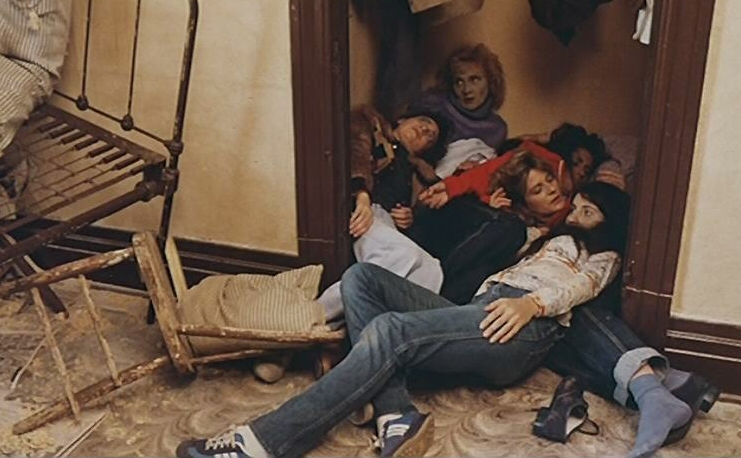
The director is Tom McLoughlin, who made Date with an Angel. He also directed the extremely goofy Friday the 13th movie that opens with Jason doing the James Bond bullet shot with a machete and plays the Alice Cooper song "He's Back (The Man Behind the Mask)" over the end credits. In both movies, a scared young girl recites the "Now I lay me down to sleep" prayer (guess that's the only prayer Tom McLoughlin knows?) A line I always liked from that movie is when one camper, hiding from Jason, queries his friend: "So, what did you WANT to be when you grew up?" One Dark Night has no memorable dialogue, although it does have a confounding moment where the lead girl calls E.G. Daily a "nerdel-brain," to which E.G. nods approvingly and acknowledges "Very nice." I'm not even sure how to spell "nerdel-brain." If it's the way I've got it is correct, urbandictionary.com defines it as "a hybrid of nerd/model, an IT person who is of exceptional good looks." That doesn't describe E.G. at all...maybe a second definition would help? Apparently it can also be "used to describe insecure nerdy people, often British, who wear turtlenecks and scarves." Like Harry Potter? This isn't helping...
The mausoleum that serves as the main set looks exactly like the one used in Phantasm. When one movie's sell is "a creepy mausoleum...where a physic vampire re-animates dead corpses" and the other's is "a creepy mausoleum...run by a giant guy with super strength who squishes dead bodies into deformed dwarfs and uses tuning forks to transport them to his planet for slave labor with the help of flying silver balls that gouge out people's brains"...I'm just saying, not that it's anybody's fault, but one of them is going to pale in comparison. It's going to be the one shot with a very flat TV look that doesn't have flying silver balls. All the bio-energy in the world wouldn't make this movie as interesting as Phantasm, or similar "weird power showdown" horror films like Carrie, The Fury and The Sender.
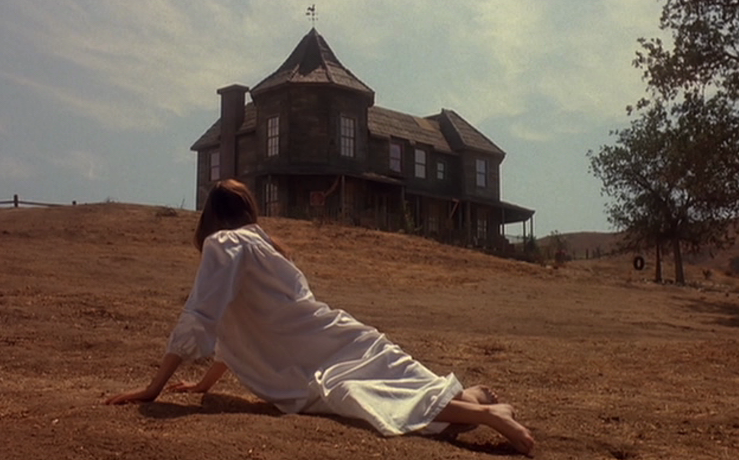
experiencing
BAD DREAMS
andrew fleming, 1988
Your brother's not the only one who can have bad dreams. They could just as likely plague Jennifer Rubin, who already suffered some deadly nightmares as one of the Dream Warriors in the second Freddy sequel (she was the one who says "In my dreams, I'm bad...and I'm beautiful.") They even come to her when she's safely locked away in a sanitarium run by a well-meaning but skeptical male shrink, the exact same set-up as Nightmare 3. And they manifest as a supernatural killer who dispatches the other patients around her one at a time - it's convenient for him since the victims' history and interment at a nuthouse suggests suicide, which if I recall was also the M.O. of a certain wise-cracking burned demon-ghost who wore a fedora. At least the monster in this one is different...he doesn't have a fedora. But he is a wise-cracking ghost who died in a fire and now looks like a hideous burn victim...sorry movie. I know Dream Warriors was released just one year earlier but the similarities are insurmountable. I may never have put it together if you borrowed the Zsa Zsa cameo, but a whole cast member? Of course we're gonna notice.
It's funny that I went into this thing blind, having just seen MMMM at TIFF and the theather Chris Funderburg programs. Both films deal with a fragile young lady coping with life after escaping a commune centered around a messiah-like leader and experiencing shifting realities that suggest she may never get over her past. Rubin's exit from the cult is a little more dramatic: the head hippy psycho (creepily played by cult character actor Richard Lynch) convinces his flock to let him baptize them with kerosene and to set them on fire ("If I kill you, it's because I love you!"); Rubin is the sole survivor who slips into a coma and wakes up ten years later (the same age, apparently.) The docs think Rubin is "estranged from herself" and don't believe she's really seeing her old savior, even after her group therapy buddies start getting chopped up and tossed out windows from the tenth floor. One Dark Night's E.G. Daily is drowned in a swimming pool.
Speaking of the previous film, if it's unfair of me to compare this movie negatively to better ones I'm sorry to say I'm just getting started. Another problem is the presence of Dean Cameron, best remembered as Chainsaw, the horror movie enthusiast and budding special make-up effects artist from Summer School. Knowing him so well from that movie works against buying his role in this film, since he is constantly doing things like stabbing himself through the hand and dissecting his abdominal area using a scalpel without reacting at all. All I could think was "Oh that incorrigible Chainsaw, I hope Fabiana Udenio is impressed." I wonder if the director (Andrew Fleming, who went on to helm The Craft and Tate Donovan's Nancy Drew) was able to see Summer School before making this one - he probably would have had second thoughts about casting Cameron as an irreverent anti-authoritarian smart aleck who applies phony-looking makeup effects to himself.
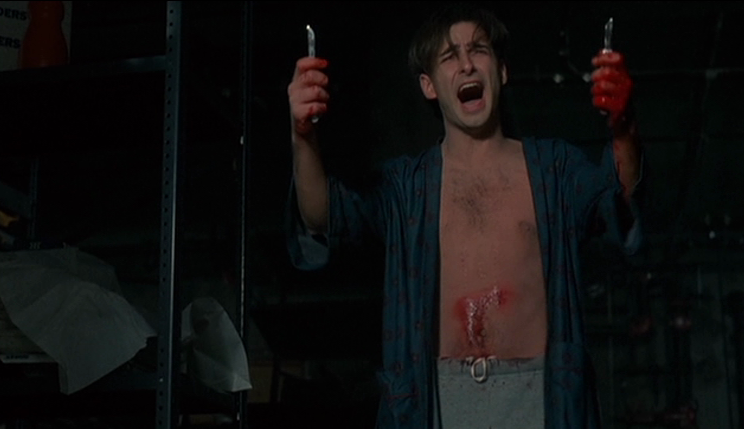
As if the Nightmare on Elm Street connection weren't enough, Bad Dreams also suffers from comparison to Brett Leonard's The Dead Pit, which (although it was released the NEXT year) was a more compelling tale of a woman in an asylum being stalked by the spree-killing ghost of a psychopath who makes everyone think she's just crazy. But whatever, I can get over the fact that this isn't the best movie about a young woman terrorized by a killer ghost in a mental health facility.
Re-Animator's Bruce Abbott plays the handsome doctor/hero and is as wooden as ever, so the most satisfying scene is one where lets loose by running down character actor Harris Yulin, screaming "You don't like the way I drive, Dr. Addictive BUTTFACE, stay out of the parking lot!" (then he rams him into the wall and shouts "TOUCHDOWN!") Unfortunately this turns out to be a dream, which also makes it singular: even though the film is called Bad Dreams, the attacks don't happen while the victims are sleeping. Even Rubin's hallucinations of her tormentor take place while she's awake with other people around. It's weird...almost like they decided to go with that title so people would draw a connection to the Elm Street sequel. Guess that's a smart move, to draw in the Freddy crowd at the height of his popularity. It could also be that the writers (one credited is Steven E. de Souza, whose name always warrants more prestige than it should since he worked on the first two Die Hard scripts and wrote the superlative Knock Off) were hoping some viewers would incorrectly conclude that Rubin must still be in her coma and dreaming the entire movie
Excellent also is the climax, where the villain holds a gun to his head, a cop shouts "Don't do it!" and Abbott says "Do it." (He doesn't, he pussies out.) I'll tell you something confusing for us character actor aficionados: the cult leader's name is Harris, but since Harris Yulchin plays the head doctor I kept getting confused when Rubin said she was "waiting for Harris." It gets even more confusing later when it turns out Harris Yulchin IS the one doing all the bad things that the dead "Harris" is being blamed for, and that Rubin starts seeing Harris Yulchin as Harris-the-character (also, I think Yulchin's character is named 'Berris.')
~ OCTOBER, 2011 ~
